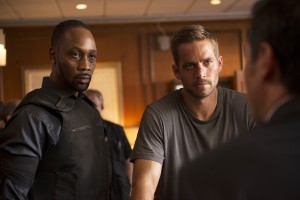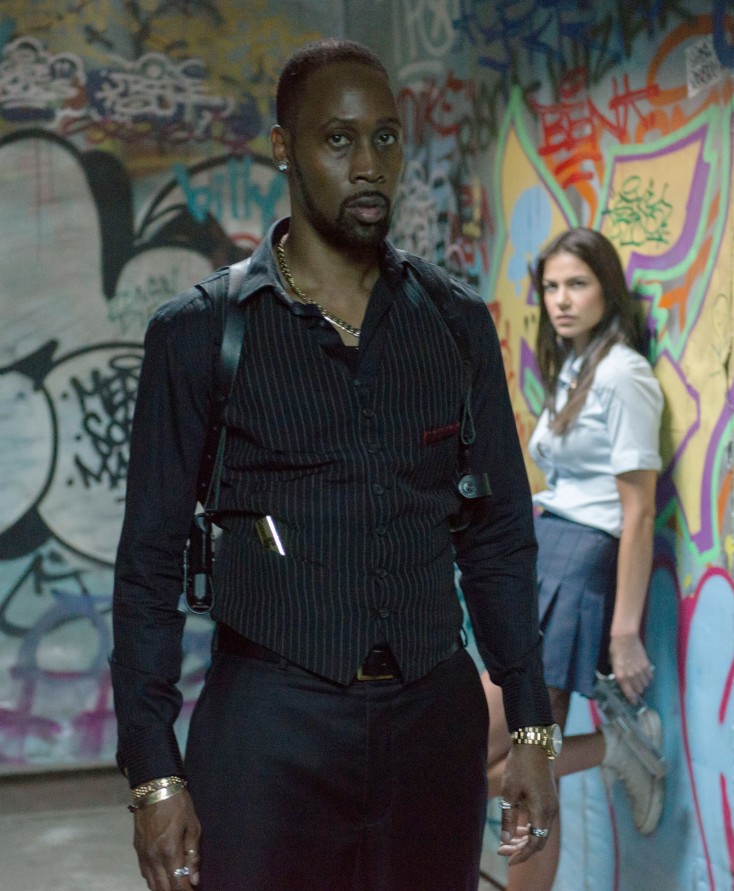
(l-r) RZA and Paul Walker star in Relativity Media’s BRICK MANSIONS. © 2013 EUROPACORP /BRICK MANSIONS, INC. CR: Philippe Bosse’
By PETERSON GONZAGA
Front Row Features
HOLLYWOOD—RZA is known for his legendary record producing skills and the founding member of Wu-Tang Clan. The rapper also has been able to move smoothly into the film and TV world without any hesitation. Along with his acting chops, RZA has parlayed his musical talent into composing music for the big screen.
Based on Luc Besson’s French film “Banlieue 13,” “Brick Mansions” stars RZA as crime lord Tremaine Alexander, whom Detroit undercover cop Damien (Paul Walker) hopes to bring down when he goes undercover and infiltrates the drug- and crime-ridden walled area of Detroit known as Brick Mansions.
Sitting down for an interview in the cafe area of the Arclight Cinemas in Hollywood, RZA reveals that he is a fan of the wall-jumping practice of parkour, which is seen in the action drama. He also discusses his involvement in the film, challenging himself to become a better actor and the loss of his co-star Paul Walker.
RZA also appears in the upcoming Fox series, “Gang Related,” premiering on May 22.
Q: How did “Brick Mansions” become a project you were interested in?
RZA: I read the script maybe about a year and half before it finally went into production and Tremaine Alexander was a very interesting character that I thought I could help bring to the screen. I kept my eye on it and how many actors trying to get a hold of it. When it got closer (to production), I got a chance to meet Luc Besson, the producer. He saw what he was looking for. When it went to green light, they gave me a call and asked if I was interested in doing the character, and I said I was pretty sure then I had the right time. It was proper in the stars, and so here I am.
Q: Was there anything in particular that drew you to your character?
RZA: First of all, I’m a fan of parkour. So I’ve seen David Belle (who starred in the) original film, “District: B13,” and I loved it. I got two copies of it. (He laughs.) I knew this movie was a remake of that movie. I was confident the remake would be more Americanized and a better film. Usually, films are made for a reason, and a certain kind of sensibility. The rewrite and remake was aiming at our audience and I wanted to be a part of it. When it was (greenlit), it really didn’t take a lot of convincing for me. Tremaine is a guy, a villain character, who has a lot of power, is short-tempered (and has) low tolerance, but yet underneath that, he’s a product of his environment. I was interested in bringing that energy to the screen. When I look at me as an actor, I try to find myself in different situations that will continue to show my range of acting, continue to show that I am acting and continue to show that I am going to be good at this. I want to prove that. I read what people say—I can’t do things. I read what people say—I’m not doing something well. I say, “Okay, I’m going to do it better, next time! How ‘bout that?”
Q: So you take those negativities and turn them into something to drive you?
RZA: If you look at some of the roles I’ve played—like I went from “American Gangster” to “Derailed.” In “Derailed,” I started off as a quirky office kid who, at one point in the story, changes to become an ex-criminal. I thought, “Who cares about an ex-criminal.” I started off as a quirky office kid, because in the office, we act different than we act around our friends. But when you get out of the office, it’s like, “Ah, all right, he’s been through it.” That was my plan. It worked with the director. It worked with the audience. When they rated the test sheets, they gave me a good number. When I came out onto my next role in “American Gangster,” I’m the guy that was going to help the cop is bring down the bad guy. That particular role was also a challenge for me. I’m supposed to be on the gangster side. I mean, I grew up in the streets. I was a ninth grade drop out. My friend became a cop and I became a rapper. Honestly, it worked out better for me to do something I was not expected to do. When they had the consulting cops hanging around us (during filming), I was asking questions and I absorbed the energy, so I became a cop. That’s what I had to do. As you go on and look at each of my roles, I’m trying to not be that rapper. When I finally took a job as a rapper, I became the rapper that I’m not. I’m the guy I’m rapping about.
Q: Is that what you like to try to do, be the opposite of what you see in the mirror? Someone that people would never expect you to do?
RZA: Yeah. That’s what I strive to do. I strive to be something different. Acting is acting. It’s playing. If I can emulate something, I’ll emulate it. If I could find within myself and deliver it to the character that I’m commissioned to play, I’ll do that. If I have to totally make it up from nowhere, I’ll do that too.
Q: As a legendary hip-hop music producer, co-founder of Wu-Tang Clan, how hard was it for you to move forward in film and TV as an actor and composer and prove yourself?
RZA: It’s an ongoing thing. Every actor is still proving himself. Look at the great Mickey Rourke. He was the best. He had to go away from us for a few years and come back to us. We missed him. We were happy when he came back. We could go through a lot of great talent and say, “What happen to so and so?” Hopefully they come back. We loved their work. You’re always going to have to prove yourself. At least be satisfied with yourself. That’s what I work for—self-satisfaction. I’m being satisfied with myself. I like what I’m doing. I strive to be better. If I feel like I failed, I wouldn’t be ashamed to say that I failed. But if I felt like I succeeded and you feel like I failed, I may not agree with you because happiness is self-satisfaction. Some critic wrote something bad about my film and some critics wrote good things about my film. One guy wrote something so bad about it, it was like he didn’t see it. He couldn’t have seen it, and said what he said, especially when I read his reviews about other films. It wasn’t his taste. It’s as simple as that. Even if the movie wasn’t my taste, as a movie watcher, I find what makes it a movie and why did they make it a movie. When me and my wife watch movies together, we’ll be like, “Who the hell gave them a budget for this one? Who gave them the budget for this crap?” Even in a bad movie, there’s always something, and that’s the part I take with me.
Q: Is that what you can call those movies—a diamond in a rough?
RZA: I guess you can call them a diamond in a rough. Maybe not a diamond, maybe an emerald, at least. It might be something. Even a diamond starts off as a piece of coal.
Q: Having worked closely with Paul Walker on this film, what was your first reaction when you heard of his death?
RZA: I was heartbroken man. Losing good people is bad regardless whether you know them or not. It hurts you. You know, the (production assistant) we lost on the train tracks (on the “Midnight Rider” production in Georgia), I don’t know her. She’s in our industry. I understand how it is to be a PA. I’ve directed a film and sent people out to scout new things for me. So to lose somebody (like Paul Walker) that’s great like that and somebody who’s a friend, I looked at him as a brother because he had the spirit, because he was a media attraction. I knew his movies. I didn’t know Paul personally until “Brick Mansions” and within the 40 days, I really felt brotherly for him. I really have brotherly love for him. I thought I would see him right now. Our plan was to see you at the press day. When you make movies, you come together with people and usually spend time together and it ends. Everybody moves on and goes their own way, but hopefully you come back and see each other during a press junket or at the premieres. He’s not here. The beauty of filmmaking is that we can look up at that screen and we can see that smile and those girls can see those blue eyes that they love. It was God’s way of getting that action they want to see. That’s the magic of filmmaking. I’m grateful that I’m here representing for him. I know he appreciates what I stand for. He left a good piece of work for us, “Brick Mansions.”





